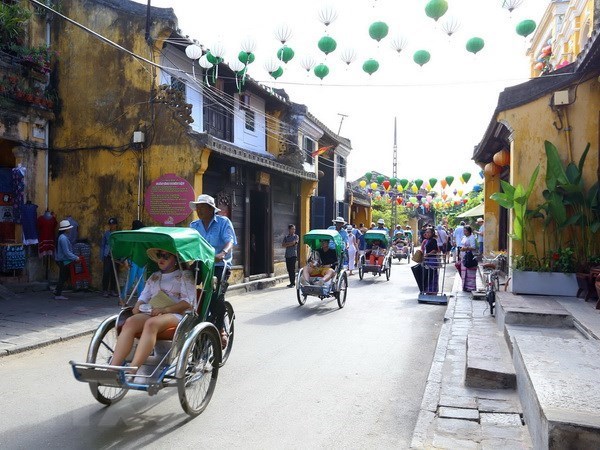
The Japan Cultural Day in Quang Nam and the 16th Hoi An-Japan Cultural Exchange will take place in Hoi An city, the central province of Quang Nam from August 17-19.
Visitors tour Hoi An ancient city of Quang Nam
province (Photo: VNA)
As part of activities
marking the 45th anniversary of the Vietnam-Japan diplomatic relations
(1973-2018), the events will be jointly organised by the provincial People’s
Committee, the Japanese Embassy in Vietnam, agencies, organisations and
businesses in Quang Nam and Japan.
The opening ceremony of these two events at 8pm on August 17 will feature
attractive art performances staged by Quang Nam and Japanese artists.
There will be a wide range of cultural activities such as the re-enactment of
the wedding of Princess Ngoc Hoa and Japanese businessman Araki Soaro at Hoi An
port and the debut of the Goodwill Ambassador of the 16th Hoi An-Japan Cultural
Exchange Ueno Yuuka.
A photo exhibition entitled "Invaluable heritages” will also be held together
with a boat race, cultural and art exchanges, martial art performances,
handicraft display, and culinary activities.
In addition, the organising board will host a meeting between Japanese
investors, seminars on building and developing smart cities in combination with
environmental protection and Japan’s educational experience, and a Quang
Nam-Japan friendship exchange.
Source: VNA
With an increasingly vibrant and widespread emulation movement aimed at building cultured residential areas and cultured families, Yen Thuy District has been making steady progress toward improving both the material and spiritual well-being of its people, while fostering a civilized, prosperous, beautiful, and progressive community.
Once lacking recreational spaces and community facilities, Residential Group 2 in Quynh Lam Ward (Hoa Binh City) has recently received attention for the construction of a new, spacious, and fully equipped cultural house. The project followed the model of state support combined with public contributions in both labor and funding.
The "All people unite to build cultural life" movement, which has been effectively integrated with Kim Boi district’s socio-economic development goals, is fostering a lively spirit of emulation across local residential areas, hamlets, villages, public agencies, and enterprises. In addition, through the initiative, traditional cultural values are being preserved and promoted, while community solidarity and mutual support in poverty reduction and economic development are being strengthened.
A working delegation of the Hoa Binh provincial People’s Committee led by its Permanent Vice Chairman Nguyen Van Toan on June 11 inspected the progress of a project to build the Mo Muong Cultural Heritage Conservation Space linked to tourism services in Hop Phong commune, Cao Phong district.
Born and growing in the heroic land of Muong Dong, Dinh Thi Kieu Dung, a resident in Bo town of Kim Boi district, in her childhood was nurtured by the sweet lullabies of her grandmother and mother. These melodies deeply imprinted on her soul, becoming an inseparable part of her love for her ethnic group's culture. For over 20 years, this love for her hometown has driven Dung to research, collect, and pass down the cultural values of the Muong people to future generations.
In the final days of May, the Ethnic Art Troupe of Hoa Binh Province organized performances to serve the people in remote, mountainous, and particularly disadvantaged areas within the province. These were not just ordinary artistic shows, but they were the meaningful journeys aimed at spreading cultural values, enhancing the spiritual life of the people and contributing to the preservation of ethnic minority cultural identities.



